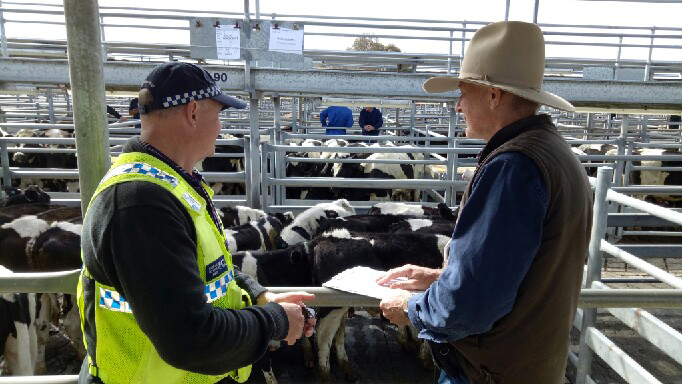Western Australian livestock sales are the focus of a targeted operation monitoring compliance with stock identification and traceability requirements.

Operation Waybill has been running this month to highlight the importance of livestock traceability in underpinning food safety and market access for our livestock industries.
Department of Primary Industries and Regional Development inspectors are visiting saleyards to check livestock and accompanying documentation complies with the Biosecurity and Agriculture Management Regulations 2013.
The Operation is supported by detectives from the WA Police Force’s Regional WA Crime & Operations Coordination Division.
Department senior compliance inspector Mike Donaghy, who is leading the effort, said producers had generally done well in adhering to the regulations.
“The operation is raising awareness about the importance of the National Livestock Identification System (NLIS) in supporting the integrity of our sheep and cattle industries, worth more than $2 billion annually,” he said.
Mr Donaghy said compliance with individual animal identification using NLIS devices and ear marks was generally very good.
“However, some areas require improvement, including correct completion of national vendor declaration (NVD) waybills,” he said.
“Some producers did not correctly fill out their NVDs. Examples include using the postal address for the place of departure instead of the road address, not entering the property identification code and address of the destination property and not including the breed of stock that are moving.
“These may seem minor, but the NVD is a very important element in our traceability system as the information is uploaded into the NLIS database.
“This database has stock movement data across Australia and is vital to assist a rapid response to biosecurity threats.
“The excellent food safety and product integrity reputation for Western Australian beef, sheep meat and dairy products relies on systems which track livestock through the supply chain.”
Operation Waybill will continue until the end of September.
Mr Donaghy said where deficiencies or errors were found, officers were following up direct with producers.
“The Department will review the key findings from Operation Waybill and work with industry to strengthen our livestock traceability system,” he said.


